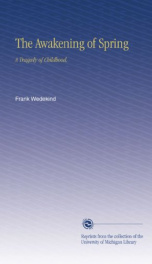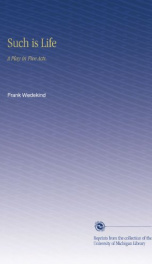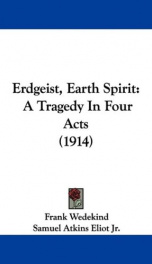Wedekind Frank

Benjamin Franklin Wedekind (Hanover July 24, 1864 – Munich March 9, 1918), usually known as Frank Wedekind, was a German playwright. His work, which often criticizes bourgeois attitudes (particularly towards sex), is considered to anticipate expressionism, and he was a major influence on the development of epic theatre.[1] Wedekind lived most of his adult life in Munich, though he had a brief period working in advertising, for the 'Maggi' soup firm, in Switzerland in 1886.[2] He had an affair with Frida Uhl who bore him a child. Having initially worked in business and the circus, Wedekind went on to become an actor and singer. In this capacity he received wide acclaim as the principal star of the satirical cabaret Die elf Scharfrichter (The Eleven Executioners), launched in 1901.[3] It was thanks to Wedekind's success that the tradition of German satirical writing was established in the theatre, producing the cabaret-song satirists Kurt Tucholsky, Walter Mehring, Joachim Ringelnatz and Erich Kästner among others, who invigorated the culture of the Weimar Republic; "all bitter social critics who used direct, stinging satire as the best means of attack and wrote a large part of their always intelligible light verse to be declaimed or sung."[4] At the age of 34, after serving a nine-month prison sentence for "lèse-majesté" (thanks to the publication in Simplicissimus of some of his satirical poems), Wedekind became a dramaturg (a play-reader and adapter) at the Munich Schauspielhaus.[5] Wedekind's first major play, Frühlings Erwachen (Spring Awakening, 1891), which concerns sexuality and puberty among some young German students, caused a scandal, as it contained scenes of homoeroticism, (implied) masturbation, and suicide, as well as references to abortion. In 2006, it was adapted into a successful Broadway musical, Spring Awakening. The "Lulu" plays Erdgeist (Earth Spirit, 1895) and Die Büchse der Pandora (Pandora's Box, 1904) are probably his best known works. Originally conceived as a single play, the two pieces tell a continuous story of a sexually-enticing young dancer who rises in German society through her relationships with wealthy men, but who later falls into poverty and prostitution.[6] The frank depiction of sexuality and violence in these plays, including lesbianism and an encounter with Jack the Ripper (a role which Wedekind played himself in the original production),[7] pushed the boundaries of what was considered acceptable on the stage at the time. The plays formed the basis for G W Pabst's acclaimed silent film Pandora's Box (1929), starring Louise Brooks as Lulu, and Alban Berg's incomplete opera Lulu (1937), which is considered to be one of the masterpieces of twentieth-century opera.[8] Der Kammersänger (The Court-Singer, 1899) is a one-act character study of a famous opera singer who receives a series of unwelcome guests at his hotel suite. In Franziska (1910), the title character, a young girl, initiates a Faustian pact with the Devil, selling her soul for the knowledge of what it is like to live life as a man (reasoning that men seem to have all the advantages). Wedekind's symbolist novella Mine-Haha: The Corporal Education Of Young Girls (1901) was the basis for the film Innocence (2004) by Lucile Hadzihalilovic and The Fine Art of Love (2005) by John Irvin.
do you like this author?
What readers are saying
What do you think? Write your own comment on this book!
write a commentWhat readers are saying
What do you think? Write your own comment on this author!
write a commentBook list

The Awakening of SpringA Tragedy of Childhood
Series:
Unknown
Year:
Unknown
Raiting:
3.5/5
Show more
add to favoritesadd In favorites

Erdgeist (Earth-Spirit)A Tragedy in Four Acts
Series:
Unknown
Year:
Unknown
Raiting:
3.5/5
Show more
add to favoritesadd In favorites
Book list

The Awakening of SpringA Tragedy of Childhood
Series:
Unknown
Year:
Unknown
Raiting:
3.5/5
Show more
add to favoritesadd In favorites

Erdgeist (Earth-Spirit)A Tragedy in Four Acts
Series:
Unknown
Year:
Unknown
Raiting:
3.5/5
Show more
add to favoritesadd In favorites

the awakening of spring a tragedy of childhood
Series:
Unknown
Year:
Unknown
Raiting:
1/5
A 1891 work by a German playwright of the nineteenth and early twentieth centuries, Benjamin Franklin Wedekind. The staging of his drama “The Awakening of Spring” (Frühlings Erwachen) had a great success in the year 1906. The tragedy of choice forms the center of the play: a fourteen-year boy commits suicide out of fear after failed exam.
Franklin Wedekind one of those who destroyed mercilessly the pernicious world of deceitful nineteenth century with its Victorian morality and cynical self-deception. Wedekind was covered with legends even during his lifetime, and his works were considered by critics to be an utter fiend, for their sincere and clear derision of Victorian morals.
Show more
add to favoritesadd In favorites
Franklin Wedekind one of those who destroyed mercilessly the pernicious world of deceitful nineteenth century with its Victorian morality and cynical self-deception. Wedekind was covered with legends even during his lifetime, and his works were considered by critics to be an utter fiend, for their sincere and clear derision of Victorian morals.
Show more

such is life a play in five acts
Series:
Unknown
Year:
Unknown
Raiting:
4.5/5
This volume is produced from digital images created through the University of Michigan University Library's preservation reformatting program. The Library seeks to preserve the intellectual content of items in a manner that facilitates and promotes a variety of uses. The digital reformatting process results in an electronic version of the text that can both be accessed online and used to create new print copies. This book and thousands of others can be found in the digital collections of the University of Michigan Library. The University Library also understands and values the utility of print, and makes reprints available through its Scholarly Publishing Office.
Show more
add to favoritesadd In favorites

Erdgeist (Earth-Spirit)
Series:
Unknown
Year:
Unknown
Raiting:
2.5/5
Erdgeist (Earth-Spirit) is an amazing play that narrates the readers about the life of Lulu who was found at the age of twelve in the street by Dr Schön who gave her a necessary education and taught her to be a real lady. When she grows older, Dr Schön arranges for Lulu a marriage with an older man named Dr Goll who dies soon after the wedding because of heart attack. Before his death he find out that his wife had a affair with a painter and could not survive it. After the end of her marriage Lulu starts her dancing career with Alva Schön and it turns out that she is very talented. She forces Dr Schön to break up with his fiancée and marry her. At the same time she is having a number of affairs with other men. So what will be next? Be prepared to dive into the events happening in the life of Lulu.
Show more
add to favoritesadd In favorites
What readers are saying
What do you think? Write your own comment on this author!
write a commentif you like Wedekind Frank try:
readers also enjoyed
What readers are saying
What do you think? Write your own comment on this author!
write a commentGenre
if you like Wedekind Frank try:
readers also enjoyed
Do you want to read a book that interests you? It’s EASY!
Create an account and send a request for reading to other users on the Webpage of the book!


